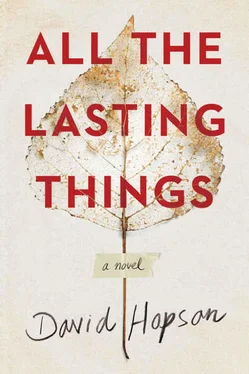“If you wanted to jump to your death,” she said, immediately doubling back on her apology to Valerie and taking up the offensive, “you’d find something higher than thirty feet. You don’t necessarily die at thirty feet. You break your neck. You spend the rest of your life in a wheelchair, dribbling onto a bib.” This put Claudia in the absurd position of arguing that Benji’s injuries, serious as they were, weren’t quite serious enough.
“We’re lucky neither of those things happened,” Valerie said. “Benji didn’t die. And the doctors are hopeful that he didn’t sustain any permanent injuries. They haven’t found any internal bleeding, which is what they were afraid of.” She fished these sentences up whole from the deep, her need for deliberation suddenly gone, as if all her voice required to find its pace was a bit of genuine nonsense to drive away. “In my experience, most suicides want to send a message more than they want to die.”
Claudia widened her eyes against another sting of tears. “A message.”
“Maybe this is Benji’s way of asking for help.”
“There’s no need for smoke signals,” Claudia said with a short, bitter laugh. “My brother’s never had a problem asking for help.” She felt a momentary urge to shame him, to parrot the list of delusions and offenses that Henry had no trouble rattling off but that she, Claudia, usually did her brother the favor of swallowing. The things she could have said, if the words hadn’t caught in her throat. He’d taken her money. He’d refused her advice. He’d quit more jobs in a year than she had in her entire life, all in the name of a dream from which everyone, everyone except Benji himself, had woken long ago. He was a disappointment. Why not say it? A failure. She sat frozen. The realization that she was about to be shattered by a sob, that tears would fall the minute she opened her mouth, struck her dumb. She didn’t breathe. Valerie, slow in speech but apparently not in understanding, brought the interview to a charitable end. She shuffled her papers away, handed Claudia her card, and left with more courtesy than Claudia expected from a woman who, thanks to her, had gotten nowhere.

Evelyn no longer woke to the sounds, but in anticipation of them. A box of Christmas ornaments crashed to the floor or he left the bathroom faucet to run or hollered for a dog that drowned in 1986. These were the bells that called Evelyn Fisher into the ring. She heard her husband rise and, now that they no longer slept in the same bed, shuffle into the tiny bathroom that connected their rooms.
“Henry,” she called, sliding into her slippers and pulling on a light, flower-printed robe as she approached from behind.
He glared at her over his shoulder, as if she were a stranger interrupting his private business at a public urinal. As she stepped toward him, he gathered into himself, hunching his back like a shy, red-faced boy. Never in their forty-three years of marriage had he lost this comical, almost perverse, sense of modesty. Not that he had anything to be ashamed of. His once daily regimen — a five-mile walk to the Episcopalian cemetery, two hundred push-ups on his office floor — rewarded him with a trim waist and powerful chest, charms that only recently, in the last two or three years, when he could no longer keep count of his exercises or be trusted to find his way home, had begun to fade. But unlike so many men his age, men with sagging breasts and beach ball bellies who took a kind of defiant pride in their bodies (or, at the very least, at the town’s Fourth of July picnic, showed a shirtless indifference to them), never did he flaunt what he had. He stayed fully dressed on the most sweltering days. Emerged from the shower only after snugging a towel around his middle. Refused to pee with her anywhere in the vicinity. The walls she’d encountered in the handsome, promising young writer, despite the corrosives of age and illness and murderous familiarity, still stood strong.
Henry inched into the corner where, like the plunger or the rusty-bristled toilet brush, he could be most inconspicuous, and tucked himself away. “I have to call Roger,” he said, forgetting his own fastidiousness as he bypassed the sink and pushed brusquely past her.
The house had five bedrooms. Henry and Evelyn no longer used the master suite, which took up the entire third floor. As they’d entered stage five, the doctors thought it safer to trim the extra flight of stairs from Henry’s routine, and Evelyn, to be closer to him in the guest bedroom, moved into Claudia’s old room. Claudia, who couldn’t have cared less about the fate of a bedspread she’d left behind twenty-five years ago, nevertheless relished the opportunity to imagine a slight.
“What about Benji’s room?” she asked.
“Your brother’s room is at the other end of the hall.”
“My brother’s room is a shrine.”
Evelyn let this fly buzz about her ears without bothering to swat it.
“What about the library ?” Now that Claudia equated printed books with an unforgivable assault on trees, on her tenets of urban planning, and so on the planet as a whole, the space the Fishers required to house them had become a fresh source of contention.
“Your father’s office?”
“You say that like it’s inviolable space. Daddy doesn’t work in there anymore.”
Again Evelyn was silent.
“Fine. Then let the library be.”
Into this large room with its salvaged army surplus desk and tufted leather sofa, Evelyn followed her husband. The worn walnut stenographer’s chair in which Henry had written five novels, two collections of short stories, and a book of essays creaked under the familiar weight. His fingers dove into the hooded desk lamp’s pool of light and started racing through his Rolodex.
“Henry,” Evelyn said. Then, sharper: “Henry!”
Without looking up, he snatched a card from the file and began tapping it on the desk. “I have to call Roger.” Between his shoulder and ear he jabbed the handset of a heavy, corded, black rotary phone that neither lit up nor folded into his pocket nor plotted the route to the nearest Walmart. His Rolodex, his phone, his weathered blue Olivetti: long before he’d gotten sick, these museum pieces (as Benji called them) stood like beloved ports in an endless technological storm. Henry had preached sermon after sermon about the evils of the electronic revolution. Since the day he allowed the children their first Commodore 64, he’d been ranting about the dumbing down of an already dumb culture. The death of privacy. The rise of surveillance. And, thanks to every armchair journalist with an unwelcome opinion and a blog, the democratizing and devaluation of the written word. Of course, the children were right: he sounded like a kook, like an angry messenger from the Amish, like a snob, but he preferred living life without a sleek silver laptop, without a promotional video on YouTube or a website for his bio and bibliography, without even so much as an e-mail address. Happily would Henry Fisher die a Luddite.
“You’re not calling Roger.”
He started to dial.
Evelyn followed a worn path across the rug and put her finger on the switch hook. “It’s three o’clock in the morning.”
He puzzled the darkness in the window, tapping the card faster and faster. “The book is done,” he said emphatically. “He needs to read the book.”
Whether he meant the abandoned manuscript locked in the safe behind him or one of the books he published years ago, Evelyn didn’t know. And better, really, not to ask. She’d learned strategies for getting her husband back to bed, for taking his hand when he got lost in the fog. In the doctor’s office, in the caregiver guides that sat beside her own bed, in her talks with Sandra, the day nurse, these tactics made perfect sense. Speak in a clear, reassuring voice. Respond to the emotion, not the confusion. Never argue. She might have said, “You sound anxious about work.” Or, “Are you missing Roger?” The proper volley was easily imagined, but Evelyn played better in practice than she did in the game.
Читать дальше













